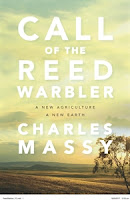 Staff review by Chris Saliba
Staff review by Chris SalibaFarmer and environmentalist Charles Massy's new book, Call of the Reed Warbler, is sure to become an Australian classic.
Early on in Call of the Reed Warbler, author and farmer Charles Massy relates an instructive story. On his New South Wales property he has a kurrajong tree. He'd always wondered how it got there, seeing it was not the type of tree you'd find in the Monaro region. One day an Aboriginal Ngarigo elder, Rod Mason, visited his property to have a look at it and became emotional. There were several long, vertical strips where Aboriginal women had stripped back the bark to make fibrous materials. The tree was 400 years old. Rod Mason, the Ngarigo elder, said seeds would have been planted by Ngarigo women, after travelling the songlines from western desert country.
The story highlights how for Aboriginal people the land is rich with meaning. For non-Aboriginal people, the relationship to land is nowhere near as strong. In short, we don't have a deep knowledge or feeling for country. We brought Western methods of farming, using intensive chemicals – pesticides and herbicides – and battered the land into submission. Now we face a situation where much of the soil has been near destroyed. Over the last 200 years, it is estimated that 70 percent of our agricultural land has been seriously degraded.
Charles Massy has been thinking deeply about the land, the environment and our relationship to it for most of his adult life. Brought up in a culture that saw industrial farming methods as the only way to work the land, with its intense use of chemicals, he slowly changed his thinking about the wisdom of such farming practices. Over time he would embrace more holistic methods of working the land.
In this remarkable book, Massy argues for five regenerative landscape functions to restore life and health to the soil: solar, water, soil, dynamic eco-systems and the human-social. The last point gets special emphasis. Massy writes that our thinking is akin to a "Mechanical mind", where we seek to impose our will on the land. Instead we need to embrace a different type of thinking, an “Emergent mind”, one that judiciously uses technology and science, but also stands back and allows nature space to breath and find its own expression.
It's hard not to think that Call of the Reed Warbler is destined to become a classic of its kind. Massy has clearly spent years thinking and talking about the land and our relationship to it. His book has echoes of Thoreau's Walden, Rachel Carson's Silent Spring and Jared Diamond's Collapse. Massy's honesty and depth of feeling, coupled with his clear vision, makes Call of the Reed Warbler essential reading.
The Call of the Reed Warbler: A New Agriculture - A New Earth, by Charles Massy. Published by UQP. RRP $39.95
To sign up for our monthly newsletter, featuring new releases, book reviews and favourite articles from around the web, click here.
No comments:
Post a Comment